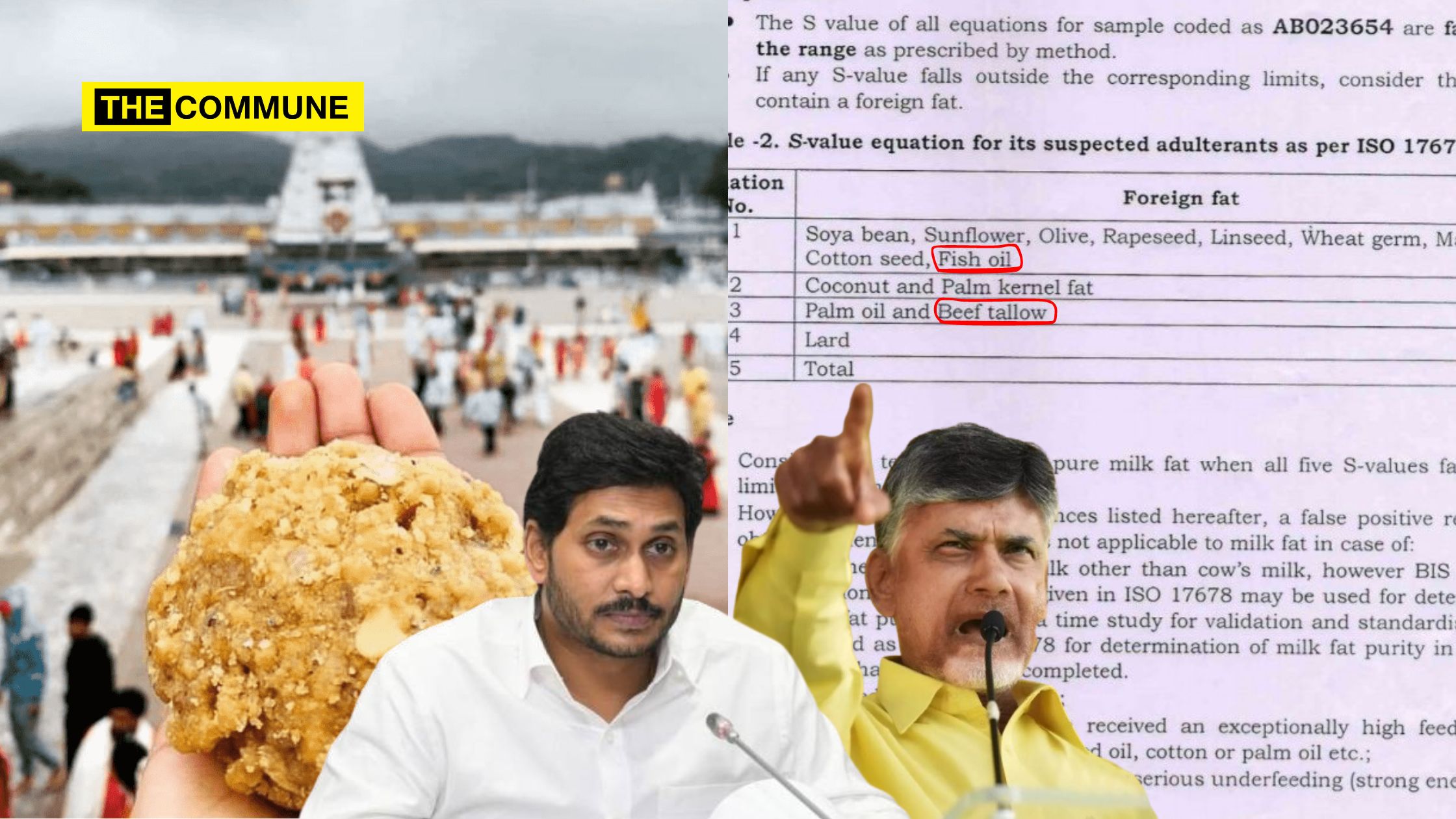
A laboratory report revealed that beef tallow, fish oil, and palm oil were used to prepare laddus, which were distributed as prasad at the renowned Sri Venkateswara temple in Tirupati.
On Wednesday, Andhra Pradesh Chief Minister N Chandrababu Naidu accused the former YSR Congress Party (YSRCP) government of using substandard ingredients, including animal fat, in the famous Tirupati laddu. However, YSRCP has denied these allegations.
The report’s findings indicate that the ghee used to prepare the iconic Tirupati laddu prasadam during the YSRCP regime contained traces of animal fat, including beef tallow and fish oil, leading to widespread outrage and claims of disrespect toward religious sentiments.
A lab analysis conducted by the Centre of Analysis and Learning in Livestock and Food (CALF) at Gujarat’s National Dairy Development Board found animal fat in the ghee used for the laddus during YSRCP’s tenure. The report detected elements like fish oil, beef tallow, and lard, the latter being a semi-solid white fat derived from pig tissue.
Don’t be surprised that someone had the temerity to toy with the sentiments of the Hindu community by going to the extent of adulterating the prasadam handed out at Tirupati temple.
When a community doesn’t stand together to protect its own interests, it usually ends up… pic.twitter.com/MtTTZVZ0El
— Rahul Shivshankar (@RShivshankar) September 19, 2024
State IT Minister Nara Lokesh also criticized the YS Jagan Mohan Reddy government, expressing shock that animal fat had replaced ghee in the Tirupati prasadam under its administration. The laddus are an offering at the sacred Sri Venkateswara temple, operated by the Tirumala Tirupati Devasthanams (TTD). During a party meeting, the Chief Minister pointed out that substandard ingredients were used previously.
Earlier, Chandrababu Naidu accused the YSR Congress (YSRCP) government of degrading the quality of Tirupati laddus, a revered temple offering. His comments sparked intense political and religious discussions, particularly affecting the relationship between his Telugu Desam Party (TDP) and YSRCP.
Addressing a National Democratic Alliance (NDA) gathering in Mangalagiri, Naidu claimed that during the YSRCP’s rule, animal fat was substituted for cow ghee, calling this a grave offense against the sanctity of Lord Venkateswara. He emphasized the need to preserve Tirumala’s religious importance, noting that his government had reinstated the practice of using pure ghee and had improved hygiene standards.
YSRCP’s Response
The YSRCP has refuted these accusations. YV Subba Reddy, a former Tirumala Tirupati Devasthanams (TTD) chairman, labelled Naidu’s allegations as “baseless.” He accused Naidu of harming the temple’s sanctity and stirring doubts among devotees. Reddy challenged Naidu to prove his claims with a public oath, dismissing the accusations as politically driven.
Ghee Quality Concerns
The quality of ghee used for making the laddus has become a central issue. The TTD oversees the temple’s operations and has proactively ensured high standards for prasadam ingredients. Official reports confirm that several batches of substandard ghee were rejected.
Between July 2022 and June 2023, the TTD rejected 42 truckloads of cow ghee for failing to meet required standards. The rejected ghee, totaling 18 tons per truckload, underwent testing for moisture content, fatty acids, and other quality indicators. Non-compliant suppliers were blacklisted.
TTD Executive Officer J Syamala Rao confirmed that one supplier’s ghee was adulterated with vegetable oils. The affected ghee was returned, and the supplier was banned. Rao emphasized strict measures to prevent future violations, ensuring only top-quality cow ghee would be accepted.
To safeguard the quality of offerings, TTD has implemented rigorous quality control procedures. Each consignment of ghee is tested for specific criteria, such as moisture content and fatty acid composition, before approval. Delivery trucks are required to maintain temperatures between 60 and 70 degrees Celsius to ensure the freshness of the ghee.
In July 2024, TTD announced plans to establish an in-house Food Safety and Standards Authority of India (FSSAI) certified laboratory at Tirumala, expediting testing processes and improving operational efficiency by reducing the need for external laboratory checks.
(With inputs from NDTV)
Subscribe to our channels on Telegram, WhatsApp, and Instagram and get the best stories of the day delivered to you personally.




